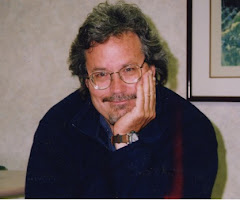
Our Thursday night book club wasn't completely without sanctification. I don't mean to mislead. Certainly we were blessed with a feast of KFC chicken, with all the trimmings. Thanks again, Mike! Share those calories, I say.
We also mined a few nuggets from the Wingren book we're currently, um, reading. Most of us. Some of it. Robin claims I haven't gotten her her own copy of the book. What's YOUR excuse?
But I wax lawful. And speaking of the Law: a quote from LUTHER ON VOCATION: Actually, it is Wingren quoting Runestam regarding Luther's understanding of the second application of the law:
"...It is in the conscience that the law is to fulfil its most important role, its usus theollogicus seu Spiritualis (theological and spiritual use), the awakening of sin. It is in the conscience after all that the law is to operate--and thereby effect a good work--in the conscience where it is the uninvited guest." P. 60
Lutherans like to talk about "terrified consciences", as though we stagger into church each week burdened beyond speech. I rather think we collect sin throughout the week like lint, and only are peripherally aware of the burden we bear. And therefore, when our sins are forgiven us, we may only peripherally appreciate the fact of it. Only rarely do we spend a night in terror at our deeds or lack of deeds.
Nevertheless, we do not naturally invite the law into our conscience. It truly is an uninvited guest, soiling our linens and drinking our best wine. WE try to purchase a clean conscience. We try to outwork the law. Or to ignore it. Trying to ignore or appease an unsettled conscience may be mankind's main historic activity: failing to gain a secure conscience by our actions or our philosophies, we try to ignore a soiled conscience by our actions, money, or philosophy.
Think of how rare access to Christ's forgiveness has been for generation upon generation. Rare, due to unbelief. Rare, due to lack of knowledge, because it wasn't understood as being possible or available. For how many millions of people has there been no one to say to them: "I forgive your sins in the name of the Father, and the Son, and the Holy Spirit" ? Think how the absence of forgiveness has formed cultures and civilizations.
In THE QUEST FOR HOLINESS by Koberle, man's attempts to storm heaven, to "sanctify himself in God's sight" is described at length:
"The sanctification of conduct by the strengthening of the will; the sanctification of the emotions by a strenuous training of the soul; the sanctification of thought by a deepening of the understanding; moralism, mysticism, speculation, these are the three ladders on which men continually seek to climb up to God..." P 2.But what else could the world do? What else would YOU do? The plain, simple, obvious answer is too plain, too simple and not obvious at all.


No comments:
Post a Comment